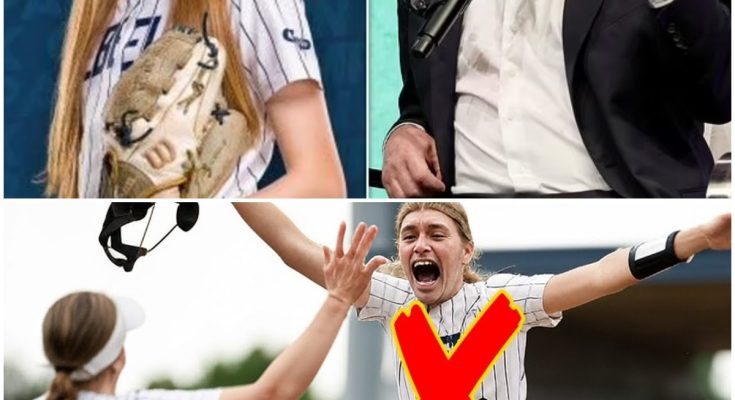
On the diamond, Marissa Rothenberger was nearly untouchable. The six-foot pitcher for Champlin Park High School seemed to have everything: a powerful arm, a calm presence under pressure, and a postseason performance that would make any coach proud. Yet, as the dust settled on a championship-winning season, Rothenberger found herself absent from the Minnesota Fastpitch Coaches Association’s prestigious All-State honors list—a stark contrast to her celebrated selection just one year prior.
The story of Marissa Rothenberger is not just about statistics and trophies. It is a tale woven with triumph, controversy, and the complex intersection of sports, identity, and society. As debates rage across the nation about transgender athletes’ participation in girls’ sports, Rothenberger’s journey has become emblematic of a much larger conversation.
A Season to Remember
Rothenberger’s numbers in 2025 were nothing short of remarkable. Pitching all five postseason games for Champlin Park, she allowed just one earned run over 35 innings and struck out 27 batters. Her regular season was equally impressive: a 12-1 record, a minuscule 0.74 ERA, and a 0.65 WHIP. At the plate, she contributed with two doubles, three RBIs, and a run scored, helping to propel the Rebels to the 4A Minnesota state softball championship.
It was a performance that, on paper, would make her a shoo-in for All-State honors. In 2024, with similar dominance, Rothenberger had been named to the first team—an achievement that brought both accolades and controversy.
The All-State Omission
This year, however, things changed. Despite her outstanding season, Rothenberger’s name was missing from the 2025 All-State list. According to the Minnesota Fastpitch Coaches Association, selection requires not only a vote from member coaches but also a nomination from the athlete’s own coach. This year, Champlin Park’s coach, Brian Whitley, did not submit her nomination.
The omission has sparked a firestorm of debate. For some, it is a sign of shifting attitudes and growing backlash against transgender inclusion in girls’ sports. For others, it raises questions about fairness, eligibility, and the responsibilities of coaches and governing bodies.
The Backlash and the Bigger Picture
Rothenberger’s success—and subsequent exclusion—did not occur in a vacuum. Across the country, the participation of transgender athletes in girls’ and women’s sports has become a lightning rod issue. In Minnesota, the debate has been especially heated. Critics argue that Rothenberger’s physical stature and background as a transgender female give her an unfair advantage on the field. Supporters, meanwhile, emphasize inclusion, acceptance, and the right for all students to compete as their authentic selves.
The controversy has reached beyond the softball field. The Trump administration has reportedly opened an investigation into Minnesota’s compliance with Title IX, the federal law prohibiting sex-based discrimination in education. Similar lawsuits and federal actions are unfolding in states like California and Maine, putting school districts and coaches under intense scrutiny.
The Coach’s Dilemma
Central to this year’s All-State snub is the role of Coach Brian Whitley. While Whitley nominated Rothenberger last season, this year he chose not to—a decision that, according to sources, may have been influenced by the mounting backlash and the threat of federal investigation.
“Selections are determined through a vote of member coaches, and an athlete must be nominated by her own coach to be considered,” a Minnesota Fastpitch Coaches Association source told Fox News Digital. Without Whitley’s nomination, Rothenberger was simply not eligible.
Some speculate that Whitley’s decision was an attempt to avoid controversy or potential legal consequences. Others wonder whether mounting public pressure or changes in personal conviction played a role. As of this writing, Whitley has not publicly commented on his reasoning.
The Human Side of the Story
Lost in the headlines and heated debates is the human element—Rothenberger herself, her teammates, and the community that has watched her grow and compete. For many, she is simply a talented athlete who worked hard, supported her team, and played by the rules set before her.
Yet the pressure has been immense. Rothenberger’s presence on the field has drawn national media attention, online backlash, and, at times, personal attacks. Supporters say she has handled the scrutiny with grace and resilience. Detractors argue that her participation is unfair to cisgender girls.
“I blame the adults for allowing this to happen,” one commentator said, echoing a sentiment shared by some critics. “The adults need to be held accountable.” Others, however, point out that Rothenberger is a high school student caught in the crossfire of a national culture war.
A Community Divided
Within Minnesota, opinions remain sharply divided. Some parents and athletes have called for clearer guidelines and more transparency from governing bodies. Others have organized rallies and petitions in support of Rothenberger and other transgender athletes.
Governor Tim Walz has publicly supported transgender inclusion in school sports, but faces mounting political pressure as federal investigations and lawsuits loom. The issue has become a flashpoint in state and national politics, with no easy answers in sight.
Looking Ahead
As the 2025 softball season fades into memory, the story of Marissa Rothenberger lingers. Her absence from the All-State list is more than a personal disappointment; it is a reflection of a society grappling with questions of fairness, inclusion, and identity.
For now, Rothenberger’s future in softball remains uncertain. Will she return next season? Will policies change? Will the conversation shift toward compromise and understanding, or will the divisions deepen?
One thing is certain: the debate over transgender athletes in girls’ sports is far from over. As communities, schools, and policymakers search for solutions, the story of Marissa Rothenberger will continue to resonate—on the field, in the locker room, and far beyond.
What do you think about this story? Should high school sports prioritize inclusion, fairness, or both? Share your thoughts and join the conversation.



